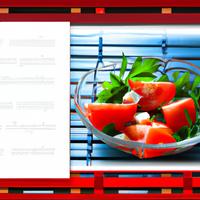
1 serving (100 grams) contains 18 calories, 0.9 grams of protein, 0.2 grams of fat, and 3.9 grams of carbohydrates.

Log this food in SnapCalorie

Nutrition Information
Calories |
42.9 | ||
|---|---|---|---|
% Daily Value* |
|||
| Total Fat | 0.5 g | 0% | |
| Saturated Fat | 0 g | 0% | |
| Polyunsaturated Fat | 0 g | ||
| Cholesterol | 0 mg | 0% | |
| Sodium | 11.9 mg | 0% | |
| Total Carbohydrates | 9.3 g | 3% | |
| Dietary Fiber | 2.9 g | 10% | |
| Sugars | 6.2 g | ||
| protein | 2.1 g | 4% | |
| Vitamin D | 0 mcg | 0% | |
| Calcium | 23.8 mg | 1% | |
| Iron | 0.7 mg | 3% | |
| Potassium | 564.3 mg | 12% | |
* Percent Daily Values are based on a 2,000 calorie diet. Your daily values may be higher or lower depending on your calorie needs.
Food Attributes
Source of Calories
About Salad tomatoes
Salad tomatoes are vibrant, juicy fruits often used in a variety of cuisines worldwide, particularly Mediterranean, American, and Middle Eastern dishes. Typically smaller and more flavorful than larger slicing tomatoes, they are prized for their sweet yet tangy taste and firm texture, making them ideal for fresh salads, salsas, and light meals. Rich in essential nutrients, salad tomatoes are an excellent source of vitamin C, potassium, and antioxidants like lycopene, which support heart health and help combat free radicals. They are low in calories, virtually fat-free, and hydrating due to their high water content. While salad tomatoes are naturally healthy, they pair well with nutrient-rich additions like olive oil, greens, and herbs for a balanced dish. However, adding excessive dressings or processed toppings can diminish their nutritional benefits. Perfectly suited for clean, wholesome meals, salad tomatoes are a staple for both flavor and health-focused eating.



